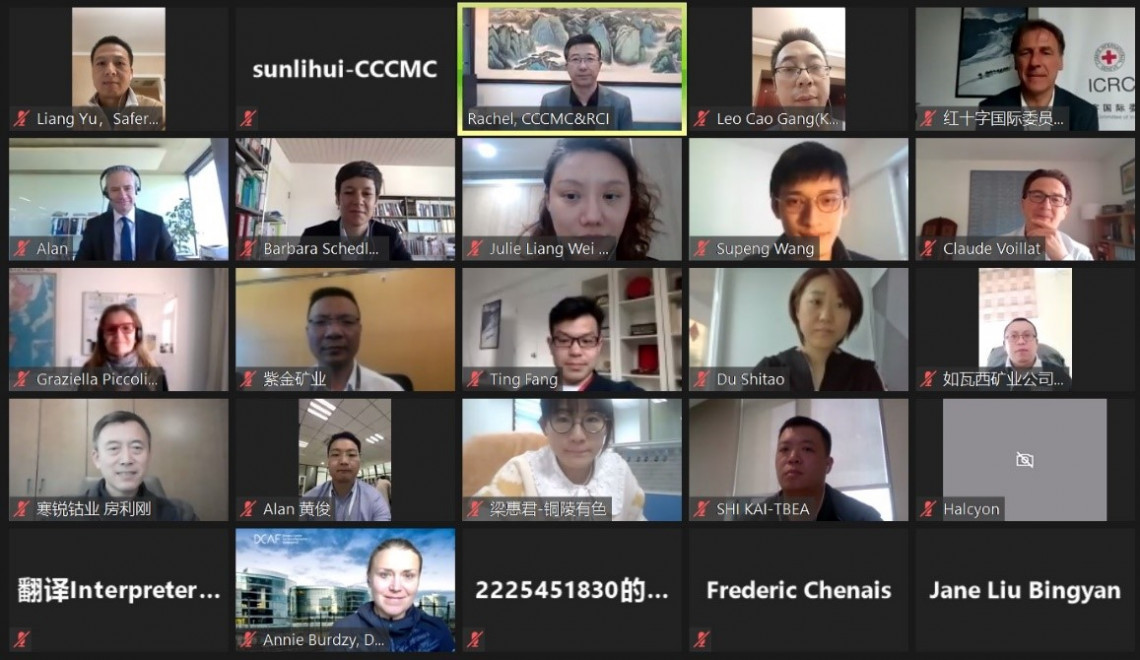
ICRC, DCAF hold webinar for Chinese companies on Voluntary Principles

The webinar was opened by director of CCCMC Mr Sun Lihui and attended by close to 60 representatives from companies, governments and civil societies.
The event aimed to introduce the VPs and Voluntary Principles Initiative (VPI) to the Chinese business community, present the multi-stakeholder working approach and good practices enshrined in the VPs, and explore opportunities for deeper engagement of Chinese companies and other stakeholders with the VPs and their approach for responsible security practices.
Voluntary Principles Initiative
The VPI, created in 2000, is a membership-based global multi-stakeholder platform dedicated to sharing best practices and mutually supporting the implementation of the VPs.
For Chinese companies operating in complex environments, the VPs can offer useful guidelines to provide security for their operations while respecting human rights.
Besides, one of the key strengths of the VPI lies in the space it creates for companies, governments and civil society organizations to share their experiences. This takes place not only during round-table meetings such as this webinar, but increasingly at the national level through dedicated multi-stakeholder in-country working groups. The ICRC and DCAF facilitate these exchanges, notably with working groups on the ground in different contexts where Chinese companies operate, such as the Democratic Republic of Congo.
Responsible security management
During the webinar, the participants discussed how to implement responsible security practices, such as through company engagement in field-level working groups.
Mr Jacques Pellet, personal envoy of ICRC President for China and head of ICRC regional delegation for East Asia, stressed that, "Responsible security management – a security management that creates no harm to the lives, livelihood and dignity of local populations – is an extremely challenging responsibility. "
Responsible security management by the business sector can provide a solid basis for broader responsible security governance and create a prevention framework.
The participants commended that the webinar had served as an important opportunity to promote best practices and encourage win-win exchanges between the Chinese business community and entities with rich experience in the field of VPI.
The ICRC and DCAF were delighted to be able to strengthen awareness among Chinese companies not only about the tools they developed, but also on ways companies could engage in multi-stakeholder processes to promote the VPs with this significant stakeholder group.
Tailored tools and training for companies operating in complex environments
As observers to the VPI, the ICRC and DCAF also highlighted some of the tools developed in the ICRC-DCAF partnership. The Toolkit on Addressing Security and Human Rights Challenges in Complex Environments has been translated into Chinese. It helps companies take into account security issues within their systems, policies and processes under a prevention-based logic. It also helps companies organize their security arrangements with host governments, public and private security and communities.
In order to help business practitioners and executives gain in-depth knowledge on security and CSR management in complex environments, the ICRC and its partners are also developing training modules focusing on responsible security management for Chinese businesses operating in complex environment overseas.
The ICRC, DCAF and the CCCMC, who signed a framework agreement in 2019, are working together to develop tailored training tools.
